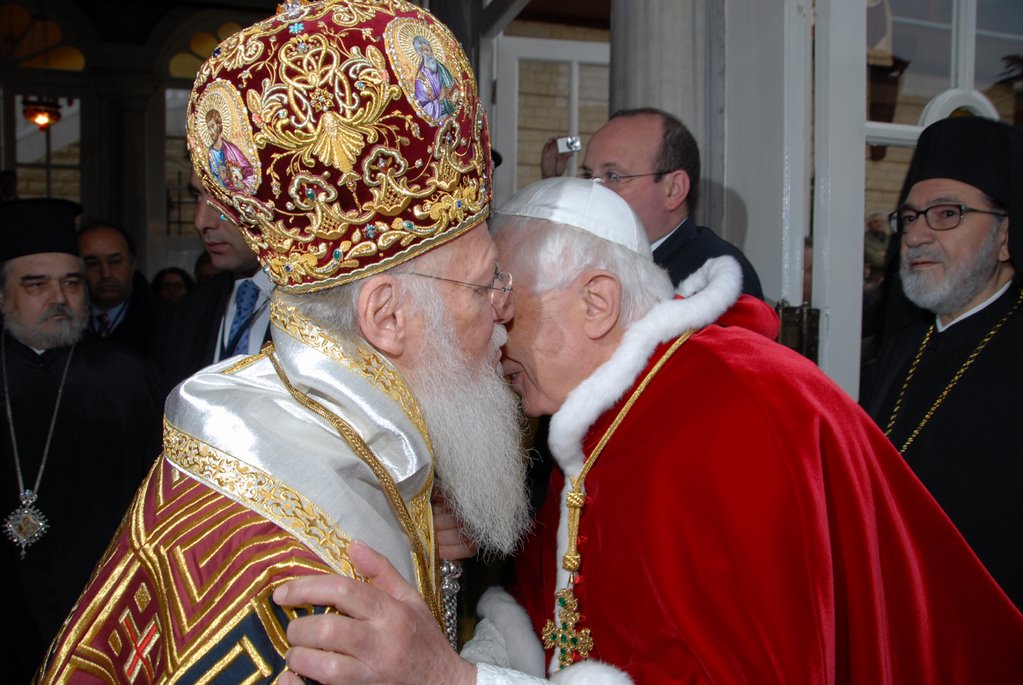
There is lots of talk about the Spirit of Vatican II, Fr Henry has "fisked" an interesting interview with the wise Cardinal Piacenza, stating the constant message of this Papacy, "Vatican II was not a Council of rupture".
I have a Greek bishop friend, who teaches theology and is a theological advisor to the Patriarch of Constantinople. I am not sure that much that VII says really interests him, his big problem is Vatican I and what it says about the role of the Pope and the nature of Papal Infallibility. That is the sticking point for any hope of re-union with the East, in the past when I have talked about the possibility of re-union with him, his answer is really "It is impossible", because of Vatican I.
It is interesting that on the Orthodox side there seems to have been developments, though any Orthodox worth his salt would hate that word, so let us speak of a "deepening understanding or of questioning" of the role of "Patriarchates" and their relationships with one another, really because of the preparations for the Pan-Orthodox Synod, which may or may not happen. One of the issues that is on the agenda is the ranking of the Moscow Patriarchate in relation to those of Apostolic origin and especially Moscow's relationship to Constantinople, Constantinople's relationship to Athens is another matter. Although it will never be discussed publicly the Roman Patriarchate is actually important for Orthodoxy, both in how it sees itself but also in the claim that Orthodoxy would make about us falling into heresy or having gone into schism, yet if "first Rome has fallen", what about Moscow's claim that it is the third Rome because "Constantinople, the second Rome has fallen". What is meant by "falling"? Why is it the there are several claimants to the Patriarchates of Jerusalem and Alexandria, and yet there is only one unchallenged claimant to the Roman Patriarchate? What is the relationship of Constantinople to other autocephalous Churches, especially Patriarchal ones.
Another issue not unrelated, is the validity of the sacraments of what Orthodoxy sees as schismatic and heterodox Churches and ecclesial communities. This relates to how distant, how fallen, are Protestant communities and their sacraments? Are they the same as Oriental Orthodox Churches who rejected Chalcedon, and what about the sacraments of those in communion with Rome, not only Latins but also Orientals and Byzantines.
But the big problem for Orthodox as far as Rome is concerned are the claims, perhaps perceived claims, "the Spirit of" Vatican I, they at least symbolise the rift.
For Catholics there seems to be a blurring of Ordinary and Extraordinary Magisterium. The teaching on artificial birth control and the impossibility of female ordination to the priesthood (and episcopate) are increasingly put forward as "Infallible" teachings, but not so much because they were taught by Pope Paul VI or Pope John Paul II but because they have "always and everywhere" been taught by the whole Church.
For all the exalted language surrounding Vatican I, and certainly the "Spirit of Vatican I" hype afterwards, nothing that has been declared as "Infallible" since 1870 is new, everything is found in the first of the first millennium, that is before the break between East and West.
For the last thousand years, since the great schism a the theology of Patriarchate has been unimportant in the West but the more Ecumenical dialogue developes and the more we come value the the East, the more "a theology of chairs" becomes important.
Vatican I speaks of the Pope having "universal" authority over the whole Church, and indeed the first title ditched by Benedict XVI was "Patriarch of the West", which for Orthodox was seem a slight modification of "Universal Patriarch" but in practice what does it mean? Does it actually mean anything different in the second and third millennium than it would have meant in the first? Does it mean more than occupying the first chair but in fellowship with, rather than dominance of, other Patriarchs.
Was Vatican I a Council of rupture?







0 comments:
Post a Comment